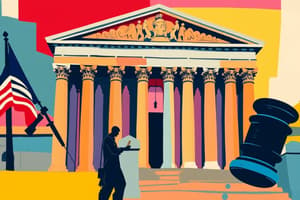Podcast
Questions and Answers
What is the difference between substantive due process and procedural due process?
What is the difference between substantive due process and procedural due process?
Substantive involves determining whether a law is fair. Procedural is the method of government action on how the law is carried out.
What are the rules regarding religious clubs that meet in public schools?
What are the rules regarding religious clubs that meet in public schools?
They are allowed to meet after class hours. Excluding them would be unconstitutional content-based discrimination.
What was Chief Justice Warren's reasoning in Brown v. Board of Education?
What was Chief Justice Warren's reasoning in Brown v. Board of Education?
Warren found that 'in the field of public education the doctrine of 'separate but equal' has no place' because 'separate but equal' facilities are inherently unequal.
What five rights are guaranteed by the Fifth Amendment?
What five rights are guaranteed by the Fifth Amendment?
How has the freedom of religion in schools been interpreted by the Supreme Court?
How has the freedom of religion in schools been interpreted by the Supreme Court?
What is the role of the police in protecting the rights of the accused under the Fifth and Sixth Amendments?
What is the role of the police in protecting the rights of the accused under the Fifth and Sixth Amendments?
How was the protection against unreasonable search and seizure incorporated by the Supreme Court under the 14th Amendment?
How was the protection against unreasonable search and seizure incorporated by the Supreme Court under the 14th Amendment?
What are the two protections of freedom of religion guaranteed by the First Amendment?
What are the two protections of freedom of religion guaranteed by the First Amendment?
What amendments were passed following the Civil War to ensure the rights of former slaves?
What amendments were passed following the Civil War to ensure the rights of former slaves?
How have civil liberties and civil rights evolved over time?
How have civil liberties and civil rights evolved over time?
What is the strict scrutiny test?
What is the strict scrutiny test?
Study Notes
Due Process
- Substantive Due Process evaluates the fairness of laws, determining if they violate fundamental rights.
- Procedural Due Process focuses on the methods and procedures used by the government to enforce laws, ensuring fair processes.
Religious Clubs in Schools
- Religious clubs can meet in public schools after class hours.
- Excluding these clubs constitutes unconstitutional content-based discrimination, as established in "Good News Club v. Milford Central School" (2001).
Brown v. Board of Education
- Chief Justice Warren ruled "separate but equal" has no place in public education, as it inherently creates inequality.
- This decision overturned "Plessy v. Ferguson" (1896) and marked the decline of segregated schools.
Fifth Amendment Rights
- Guarantees rights of the accused including:
- Right to a grand jury
- Protection against double jeopardy
- Right to eminent domain
- Right against self-incrimination
- Right to due process
Freedom of Religion in Schools
- The Supreme Court's interpretation of the establishment clause has varied over time:
- "Everson v. Board of Education" (1947): allowed busing for parochial school students.
- "Engle v. Vitale" (1962): banned official school prayer.
- "Westside School District v. Mergens" (1990): allowed school facilities for nonexclusive religious organizations after hours.
Role of Police and Rights of the Accused
- In "Miranda v. Arizona" (1966), police must inform arrested suspects of their rights to remain silent and consult an attorney to protect against coercive interrogation practices.
Unreasonable Search and Seizure
- The Supreme Court, in "Wolf v. Colorado" (1949), extended protections against unreasonable search and seizure to state actions through the 14th Amendment's due process clause.
First Amendment and Religion
- Establishment Clause: Prohibits the government from establishing an official religion or favoring one.
- Free Exercise Clause: Allows individuals to practice their religions freely, as long as practices do not harm society or violate laws.
Post-Civil War Amendments
- 13th Amendment: Abolished slavery.
- 14th Amendment: Defined citizenship and ensured due process and equal protection under the law.
- 15th Amendment: Prohibited voting discrimination based on race or previous servitude.
Evolution of Civil Liberties and Rights
- Civil liberties and rights are grounded in the Declaration of Independence, Constitution, and Bill of Rights.
- Evolved through legislative actions, judicial interpretations, and the addition of amendments like the 14th Amendment.
Strict Scrutiny Test
- A legal standard used by the Supreme Court to evaluate laws that may discriminate.
- Laws deemed suspect must serve a compelling public interest to be upheld; the government bears the burden of proof for justification.
Studying That Suits You
Use AI to generate personalized quizzes and flashcards to suit your learning preferences.
Description
Test your knowledge on civil liberties and rights with these AP Government flashcards. Explore key concepts like substantive and procedural due process, as well as regulations on religious clubs in public schools. Perfect for AP exam preparation.




